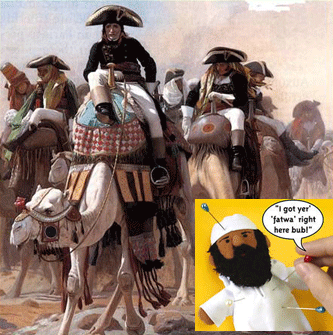
Consider the opening line of the lead story in yesterday’s New York Times:
BAGHDAD — Saudi Arabia and Libya, both considered allies by the United States in its fight against terrorism, were the source of about 60 percent of the foreign fighters who came to Iraq in the past year to serve as suicide bombers or to facilitate other attacks, according to senior American military officials.
In the long durée, as Napoleon might say if he were alive today, politics makes strange embedded fellows of nation states. There are three nations at play here in the field of lording over by the world’s reigning super power. Iraq and Libya had European imposed (and later revolution-deposed) monarchs at mid-stream in the 20th century. At the same time Saudi Arabia’s royal line evolved an iconclastic religiously mandated kingship that has withstood toppling and seems likely to do so far into the security based future. All three states are where they are today largely because of the world’s thirst for crude oil. The same three states, should Iraq survive de facto federation, face a future defined by a mega-politicized war on terrorism, a war with no state-like enemies being fought by a coalition of nation states willing to arm themselves to the teeth with conventional weapons and make airline passengers take their shoes off each and every time they fly. Two centuries from now a future Napoleon, whatever his or her nationality, may look back on the current political climate and have a hindsight sense of déjà vu, or will it be more of the voodoo politics mass mediated today?
Imagine what Napoleon would think about today’s news story. Some two centuries forwarded, the sibling democratic experiment across the Atlantic, in alliance with the dreaded British colonial juggernaut, has been able to accomplish what the French general bungled: a political hegemony in the near Orient. The Ottoman caliphate, which allied itself with British admirals to defeat the French legions, is now a secular dictatorship insisting on preventing Muslim parliament members from wearing a head scarf in the halls of power, not unlike in public schools in his native France. At the time the future Iraq was firmly (give or take the Kurdish homeland) under Ottoman control. Israel was yet to be established as a national homeland for Jews from every place they fled, just as Napoleon envisioned when nearing disaster in the Palestine of his day. Arabia was not yet housed under the banner of Saud and the iron-fisted reformer Muhammad Abd al-Wahhab was less than a decade in his grave when the French fought Mamlukes at the Battle of the Nile. And Libya? In 1801, before the French forces were handed a humiliating defeat by the British in Palestine, the Libyan pasha declared war on Thomas Jefferson’s United States for refusing to pay tribute to safeguard American merchant shipping in the Mediterranean.
How the world changes in only two centuries. How much it will change in two more, should most of the present population be left behind in any future apocalyptic scenarios.
Napoleon would probably not be surprised at the shifting alliances in the 21st century version of warring against terrorism. He himself was a terrorist to the Mamlukes and Ottomans, daring like Osama Bin Laden to style himself a savior of the Muslim world from corrupt regimes. Surely the Libyan pasha was a terrorist to the author of America’s Declaration of Independence. The only thing new about the current war on terror is the scale of weapons and the speed of communication. Déjà vu all over again, as Yogi said.
But consider the irony of the opening line quoted above. The United States is in control, for better or for worse, of Baghdad and is not likely to walk away, Vietnam-style, no matter who takes over from the House of Bush in a year’s time. As long as our cars and homes need gas and oil, America will play the selective role of the world’s policeman where the stakes are highest. The Saudis are our allies because they buy a lot of our weapons, but it was the American presence in the kingdom that pushed Osama Bin Laden over an Afghan cliff onto the world’s most wanted terrorist list. Libya has signed on recently to American friendship (like so many other dictatorships for sale) for pragmatic interests after a socialist experiment that has run its course. But the very suggestion that Libya is on “our” side against the terrorists has a Woody Allen Sleeper motif that only Hollywood could imagine.
Read my fingertips (I do understand the limitations of a blog), my friend: we are seeing history repeat itself and it is déjà voodoo to boot.
[Tabsir Redux is a reposting of earlier posts on the blog, since memories are fickle and some things deserve a second viewing. This post was originally made Friday, November 23, 2007]
Daniel Martin Varisco